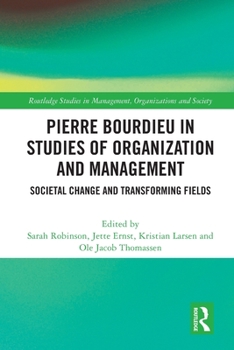Pierre Bourdieu in Studies of Organization and Management: Societal Change and Transforming Fields
Select Format
Select Condition 
Book Overview
There is increasing academic interest in how Pierre Bourdieu's sociology can be applied to management and organization studies (MOS). In a context of increasing complexity faced by organizations and those who work in them due to globalization, neoliberalism, austerity, financial crisis, ecological issues, populism and developing technologies, there is untapped potential to use Bourdieu's theoretical inventions to arrive at greater understandings of how change, transition and crisis shape work, organizational life as well as relations between different organizational and sectorial fields.
This book aims to take a specific focus on the relational nature of Bourdieu's work and its relevance for contemporary organizations. It provides empirically-grounded examples that showcase the explanatory strength of Bourdieu s intellectual concepts, such as field, habitus, capital, hexis, hysteresis, symbolic power, symbolic violence, doxa, illusio as applied to the current challenges within MOS. Such challenges include issues resulting from globalization, neoliberalism, financial crisis, ecological crisis, populism and developing technologies, to name but a few; and added to those, a global pandemic. The twelve chapters presented in this book study a great variety and range of organizational phenomena that are organized into three thematic sections: 'Neoliberalism, fields and hysteresis', 'Global and national movements as sites for competition and symbolic domination' and the 'The emergence and transformation of professional fields'. The chapters show a concern with the challenges and opportunities such developments offer to MOS scholars and to managers and employees in public and private sector organizations.
It will be of interest to researchers, academics and students in the fields of organizational studies, critical management studies, human resource management and sociology.





